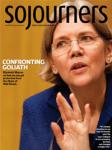In January, a congressional briefing opened with a nod to the Alcoholics Anonymous model: “We’re the richest country in the world, and we have a hunger problem,” admitted Rep. Jim McGovern (D-MA). And poor nutrition often accompanies this hunger, as low-income families adopt eating strategies that fill rather than nourish. Americans below the poverty line consume fewer fruits and vegetables, and more low-quality, processed foods, than people in higher income brackets. Low-income Americans are at the bottom of our nation’s food chain: They’re hungry, and they’re struggling to avoid eating rubbish.
The report McGovern was introducing, by the Food Research and Action Center (FRAC), using data from Gallup, is staggering: All but 23 of the U.S.’s 436 congressional districts (counting D.C.) have a food hardship rate of 10 percent or higher. Gallup asked more than 530,000 people whether their families had trouble affording basic food items within a 12-month period. “Yes” answers flowed in from every corner of every state. “It’s in our face,” said McGovern. “There is not a community in our country that is hunger-free.” During the recession, food hardship has increased; also on the rise is the number of people enrolled in the Supplemental Nutrition Assistance Program (SNAP), as food stamps are now called.
FRAC’s data suggest that, for many families, SNAP dollars simply aren’t bridging the hunger gap. So why aren’t SNAP benefits, which totaled $34.6 billion in 2008—but less than $5 per day for the average recipient—enough? Several public figures, including the governors of Michigan and Oregon, have chronicled their attempts to eat healthily on a “food stamp diet.” Some claim that, with an eye for sales and a lot of cooking from scratch, one can squeeze wholesome meals from a monthly SNAP allowance.
But the hunger problems of many real SNAP participants are multifaceted. Eating healthily on a low income might be feasible for those with vehicles, stoves, refrigerators, and accessible supermarkets—but such conveniences aren’t necessarily standard below the poverty line. Such factors often outweigh the information on the nutrition label in determining which items wind up in the shopping cart or basket. A SNAP beneficiary in Florida told Sojourners that many families in her position “are stuck purchasing peanut butter and macaroni and cheese dinners—filler foods—which are higher in sodium and fat, and are processed.”
Despite their high energy density, processed foods are packed with liabilities. Some studies show that high-fructose corn syrup, a cheap and virtually unavoidable additive in everything from tomato soup to wheat bread, may disrupt the function of liver cells, which can result in type 2 diabetes. With such items on the menu, it’s no wonder studies link poverty with obesity.
There are some efforts afoot to improve nutrition. More than 750 farmers markets now accept SNAP credits, making fresh foods more accessible; in Massachusetts a pilot program offers SNAP application at local health and senior centers; and last year’s economic recovery legislation increased monthly benefits for SNAP participants by an average of 18 to 19 percent.
While these things are helpful, change must go deeper. Now that the sobering statistics are out, representatives should take ownership of the needs that plague each of their districts. As a start, McGovern calls for a White House conference on food and nutrition to share knowledge, set goals, and measure progress. Recognition of our country’s hunger problem is a step in the right direction, but we must commit to the rest of the process for Americans to feel change where it matters—in their bodies and lives.
Amy Barger is editorial assistant at Sojourners.

This appears in the April 2010 issue of Sojourners
Got something to say about what you're reading? We value your feedback!